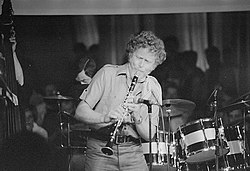Bob Wilber
| Bob Wilber | |
|---|---|

Bob Wilber at the North Sea Jazz Festival in the late 1970s
|
|
| Background information | |
| Birth name | Robert Sage Wilber |
| Born |
15 March 1928 New York, New York, U.S. |
| Genres | Jazz, dixieland |
| Occupation(s) | Musician |
| Instruments | Saxophone, clarinet |
| Years active | 1950s–present |
| Labels | Circle, Arbors |
| Associated acts | Kenny Davern, Dick Hyman, Soprano Summit, World's Greatest Jazz Band, Sidney Bechet |
Bob Wilber (born 15 March 1928) is an American jazz clarinetist, saxophonist, and band leader. Although his scope covers a wide range of jazz, Wilber has been a dedicated advocate of classic styles, working throughout his career to present traditional jazz pieces in a contemporary manner. He played with many distinguished jazz leaders in the 1950s and 1960s, including Bobby Hackett, Benny Goodman, Sidney Bechet, Jack Teagarden and Eddie Condon. In the late 1960s, he was an original member of the World's Greatest Jazz Band, and in the early 70s of Soprano Summit, a band which gained wide attention. In the late 1970s, he formed the Bechet Legacy Band.
Wilber was active in jazz education, including working as director of the Smithsonian Jazz Repertory Ensemble. He has written for films, including The Cotton Club. In his autobiography, Music Was Not Enough, he recounts his childhood, meeting his mentor Sidney Bechet, in 1946, and his struggles as a musician in the 1950s and 1960s.
Wilber, a "superb soprano saxophonist, a classic clarinetist, a gifted arranger and composer, and an invaluable preserver and enhancer of jazz tradition," was born in New York City on March 15, 1928. He became interested in jazz at the age of three when his father brought home a recording of Duke Ellington's song "Mood Indigo." In 1935, the family moved to Scarsdale, New York, and at the age of thirteen Wilber began formal clarinet study under his first teacher, Willard Briggs. He began listening to jazz from New Orleans, Kansas City, and Chicago by Duke Ellington, Louis Armstrong, Jelly Roll Morton, Eddie Condon, and Frank Teschemacher. He played jazz in high school and with his friends formed a "hot club", listening and jamming to records. Wilber graduated from high school in 1945. Although his parents wanted him to attend an Ivy League college, he was set on becoming a musician. He attempted to compromise with his parents by attending the Eastman School of Music in Rochester, New York, in the fall of 1945. But after one term at Eastman, he dropped out and moved back to New York City to "hang out on Fifty-second Street and in the Village."
...
Wikipedia
